Life Expectancy For Women With Multiple Kids May Be Greater Than Those Who Only Have One

The secret to a longer life may be having a big brood, according to new research published in PLOS One. This is contrary to previous studies that found reproduction leads to accelerated aging. Now, researchers are saying women who have more children age slower and live longer.
Similar research conducted among other species — fish, birds, and mice — have supported the life history theory (LHT), which suggests the trade-off for carrying another life is shorter telomeres. If DNA looked like a shoelace, telomeres would be the clear caps that protect the ends from fraying. And telomere length is thought to be a predictor of life expectancy, The Atlantic reported.
For the study, researchers followed 75 Kaqchikel Mayan women who lived in the southwest highlands of Guatemala for 13 years. They extracted DNA from saliva samples and cheek swabs to measure and control for telomere length at the beginning of the study. Lifestyle was relatively homogenous amongst the participants, where most of the participants had similar diets, levels of physical activity, education, and socio-economic status; this reduced the potential effects of confounding factors. Researchers discovered women who had more children also had longer telomeres compared to women who had fewer children, suggesting pregnancy may have some protective effects.
"These results suggest that, at least in our study population, having more surviving children acts as a protective factor, slowing the pace of telomere shortening," researchers wrote in the study.
One explanation is that having more children may lay with human's "cooperative-breeding strategy." So, for mothers, having more children would possibly increase social support from family members and friends in the community. This increase in social support could then help reduce the costs of additional pregnancies.
"In this population of Guatemalan women where high fertility is highly valued, it's possible that those who have more kids are receiving a lot more support from their families and peers," Dr. Pablo A. Nepomnaschy, one of the study’s authors, told Yahoo News. "They live in extended family groups, and everybody helps each other. If that’s the case, the women will have more energy to invest in maintaining themselves."
While the LHT predicts reproduction will take away energy that could be "used toward keeping the body’s tissues all shiny and new," thus leading to accelerated aging, researchers suggest lower reproductive costs may make more metabolic energy available for tissue maintenance, resulting in a slower pace of cellular aging and a longer life.
Source: Barha C, Hanna C, Salvante K. Number of Children and Telomere Length in Women: A Prospective, Longitudinal Evaluation. PLOS One. 2016.



























